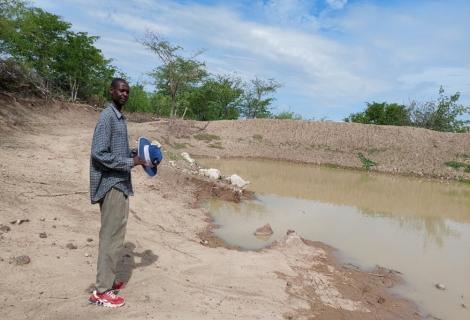EMPOWERING RURAL COMMUNITIES THROUGH AGROECOLOGY

In Binga, Zimbabwe, the impacts of climate change have reached critical levels, with low rainfall and escalating water scarcity threatening agricultural productivity and food security. These challenges place immense pressure on local communities, who rely heavily on farming for their livelihoods. In response to these pressing issues, ActionAid Zimbabwe (AAZ) and its partner Basilwizi Trust are spearheading transformative initiatives aimed at empowering residents through agroecological principles.
The impact of climate change is especially pronounced for rural women, who are often responsible for farming and water collection. Recognizing this, AAZ and Basilwizi Trust targeted training programs in agroecology for communities in Lusulu, focusing specifically on Sinamagonde Ward 21.
Francis Machimbirike, a participant in the training, described the positive changes brought about by these practices: “Agroecology has revived methods previously abandoned, such as mulching, crop rotation, integrated pest management, and dam construction for water preservation.” These environmentally sustainable solutions have revitalized farming methods and strengthened community resilience against climate-related challenges.
The local councillor, Amos Mhaka also emphasized the significance of these efforts, stating, “They are adapting to the changes of our time, addressing climate change mitigation and enhancing community resilience.”
Empowered by the training, one of the participants Francis took the initiative to construct a weir dam in Sonkwa village during the first rains of December 2024. This dam is designed to collect and store water for agricultural use, exemplifying the practical application of agroecological principles. With the dam in place, women in the community can now spend less time collecting water, allowing them to focus on other essential tasks and improving their overall quality of life. Francis shared his experience: “I voluntarily dug my small dam after receiving training on water conservation and soil management. I now feel capable of taking local actions to respond to climate challenges using resources available in my community.”
The initiatives led by AAZ and Basilwizi Trust have garnered recognition from community leaders and local farmers alike. The successful construction of the dam and the adoption of agroecological practices signal a promising pathway toward improved agricultural productivity and sustainable livelihoods. Through these efforts, rural communities are not merely adapting to climate challenges, but they are actively building a resilient future, demonstrating that sustainable practices can lead to lasting change.